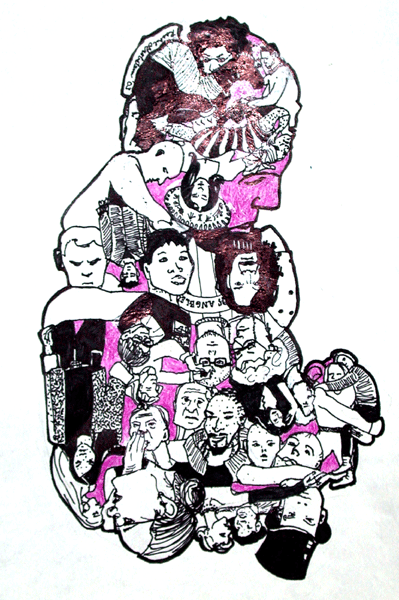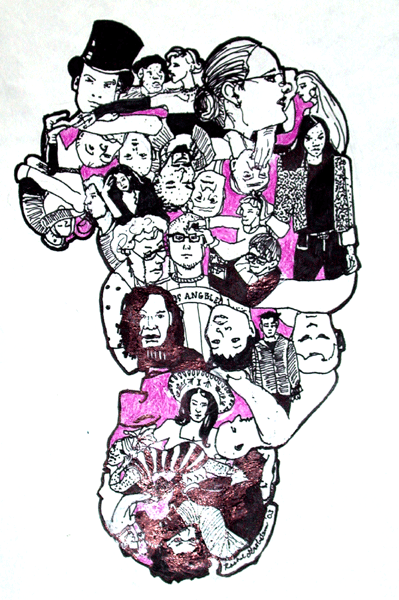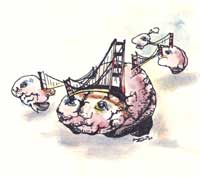 |
|
Home
| Calendar | About
| Getting Involved
| Groups | Initiatives
| ||

| Making Sense of Diversity:
| 
|
|
Yellow post-it notes (like this) reflect discussion preceding, during, following presentation Sunday morning, 5 October.
Happy to pick up from Cathy the need for a change in the culture of science, interest in brains (including her own), distaste for having to get it right and for some kinds of questions ("life-draining" ones), and the inclination/willigness to share personal stories. |
One learns by making mistakes (OR maybe we didn't have to worry about "preaching to the choir"?)
- the NBA and math (Elizabeth Ciner's fault)
- "One needs to tell students what they can't do" (contested)
- Tom Brady: that has a horrible track racord historically
- Liz McCormack, Ami Radunskya: nobody should EVER tell me (or anyone else) that
- People ARE different, people can help people recognize/understand their differences, people can show people things they might like that they subsequently decide they like better than what they currently think they want to do.
It is individuals, rather than groups, who are most importantly different.
|
David Kanis: "Please stop hounding minority Ph.D's in the interests of achieving faculty diversity"
Itzak Vatnick: Isn't it "human nature" to want to form/be a member of groups?
|
- Bertha Holliday, APA, "there is no universal human nature", "over-representation of under-representation"
- There is a need to act on behalf of groups suffering from historical discrimination, but also a risk in doing so
- Pamela Scott-Johnson (overheard): "setting apart", the potential for expectations unreasonable/unfair/harmful to the individual
Individuals within PKAL are different ("preaching to the choir" notwithstanding"):
- large, public, "historically under-represented" rich, part-time students versus small, private, "historically under-represented" poor, full-time students
- education for SMET careers vs education for science/math literacy (Jeannie Narum)
- education for "real world" (Arnie Packer) vs education for "thinking?" (Tim Haresign)
It pays to look inside every once in a while:
How do WE feel about differences?

- Some people are just clueless
- Some people are misguided because of their upbringing (culture/environment/etc)
- It is the differences among people that help us grow/change/get less wrong, individually and collectively. Learn from each other (Maria Tahamont, Mary Crowe)
Putting Brains Together - The Fable of the House
- Open the doors and windows
- Provide assistance to people who want to come in but lack preparation (Tom Brady, professional societies)
- Let me people know we want them in not despite but BECAUSE of their individual differences
- Teach science as it is, where people are (Arnie Packer, Catherine Middlecamp)
- Allow everyone to have a role in furnishing the house
Meant to, didn't make explicit enough in the fable the specific benefits of exchange between minority-rich and minority poor institutions:
|
An Instructive Game: Being Separated or Joined by Difference
- a very small preference for being surrounded by people "like oneself" suffices to produce segregation, with the cost being having fewer people around oneself who can help one discover the (inevitable) limitations of one's current perspective
- an equally small preference for being surrounded by people different from oneself suffices to assure integration and increases the likelihood of etc.
And on ....
- Carry best practices back to own campuses
- Learn from differences
- Think individually about what is next to be done, share that
http://serendipstudio.org/sci_cult/diversity/pkalmtg03.html
|
Itzak's question deserves more attention. For the reason given above, I don't think it is appropriate to think of "forming groups" as "fundamental human nature" any more than I think it is appropriate to think of warfare or murder or other long-standing human practices as "fundamental human nature" and therefore not alterable. To paraphrase Descartes: "we are AND we think, therefore we can alter who we are".
At the same time, I think there is special significance to the human propensity to form groups. The human brain has been designed (by evolution) to tell and revise "stories", and groups or "tribes" play a special role in the supporting human story-telling. The hazard with tribal stories is the same as with individual stories, that they will come to be seen (by individuals and by tribes) as the definitive story appropriately defended against all challenges rather than the stepping stones to "less wrong" stories that they are. An additional problem is that tribal stories are collectively rather than individually authored, and can therefore become contraining to particular individuals. If one too firmly identifies a tribal story with one's personal story one can get stuck. If one understands that stories, both individual and tribal, are the basis for seeking further understanding, one can get great benefits from being a part of a tribe and knowing/participating in the writing of the tribe's collective story as a component of writing and rewriting one's own. |
Home
| Calendar | About
| Getting Involved
| Groups | Initiatives
Director: Paul Grobstein -
pgrobste@brynmawr.edu
| Faculty Steering Committee
| Secretary: Lisa Kolonay - lkolonay@brynmawr.edu
© 2003, by Bryn Mawr College